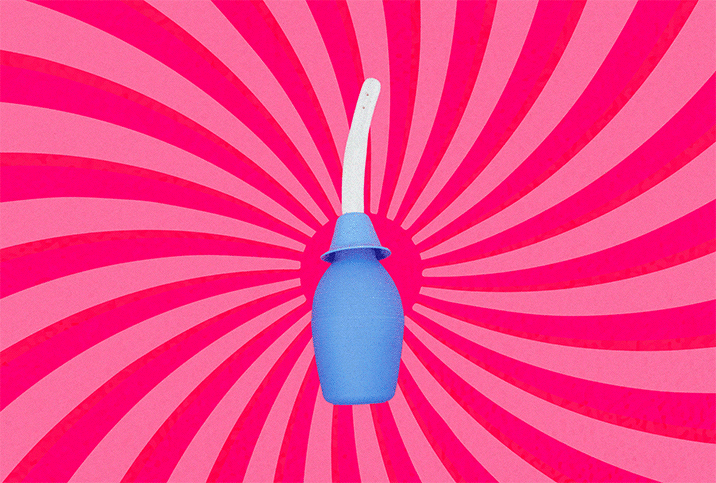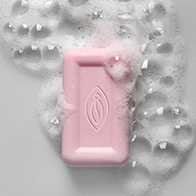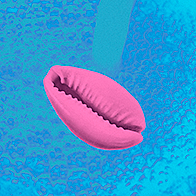Should You Ditch Your Douche?

Generally, we like to uphold a standard of cleanliness in our nether regions. Aside from wiping, bathing and shaving, another sexual hygiene practice many people consider—often as a result of clever and abundant marketing—is douching.
There are many questions of "Should we?" or "Shouldn't we?" out there, but here are the actual merits of douching, according to experts.
Getting down and…clean?
The two types of douching are vaginal and anal, also known as rectal douching. Douches are certainly not a new invention but have evolved over time.
"Douching has existed for decades, with Lysol pushing narratives about 'dirtiness' and 'cleanliness' of vaginas starting in the [early 20th century]. Before being pulled from the market, their douches were linked to many deaths," said Zarra TM, a community health advocate for Rainbow Health Minnesota.
Although they are geared toward different areas, vaginal and anal douches share commonalities in both objective and methodology.
"The process of douching in both the vagina and anus is similar," said Kate White, M.D., M.P.H., associate professor of OB-GYN at the Boston University School of Medicine and author of "Your Sexual Health: A Guide to Understanding, Loving and Caring for Your Body."
"The substances used in the douches may vary, depending on what kind of product you're using," White said, advising against making your own douche.
Zarra TM said the main difference between vaginal and anal douching is the orifice being targeted.
"There are more commercial products targeted towards vaginal douching—some called 'vaginal shampoos'—which typically include scents and other harmful chemicals," she said, adding that anal douching is more prevalent in the LGBTQIA+ community.
New York board-certified OB-GYN experts Kecia Gaither, M.D., M.P.H., and Samantha Dunham, M.D., explained the mechanism of douching: the insertion of a liquid-filled apparatus, typically resembling a nozzle attached to a squirt bottle or bag, into the given orifice.
The area is then flushed out via contractions, a bowel movement or other processes, according to Zarra TM. She listed water, vinegar and baking soda as a few examples of douching solutions, though Gaither noted anal douches typically don't contain chemicals or fragrances.
"Sterile—fresh out of the package—is better than clean, if possible," White advised. "If you need to prepare the solution, follow the instructions on the package. The temperature of the solution should be close to room temperature; certainly no warmer than lukewarm to avoid internal burns."
For smoother insertion, she recommended using lubricant and inserting the douche simultaneously with breathing out and relaxing your pelvic floor muscles.
Once the device has penetrated, experts advised to proceed with caution. Squeeze the apparatus in increments slowly to release the liquid, contracting pelvic muscles each time for a few seconds before expulsion and repeating until the container is empty (vaginal) or until the fluids come out clear (rectal).
Furthermore, White mentioned finding locations to douche that minimize mess: the shower, over the toilet or, for vaginal douching, over a towel in bed.
To douche or not to douche, that is the question
Ultimately, the goal of douching is rooted in sanitation. Odor removal is a notable counterpart, particularly for vaginal douches, according to Gaither, White and Dunham.
"The reasons why people douche are probably cultural, mixed with their habits and concerns about their hygiene. And false advertising," Dunham explained. "The patients of mine who report douching usually say they are trying to be 'clean.'"
"Some people douche because they like the feeling or because it makes them feel more confident; some douche because they feel like it's expected or is expected by their partner[s]," Zarra TM said. "For some people who've had gender confirmation or sex reassignment surgery, doctors may prescribe a rinse similar to a douche, which is not harmful and different from douching."
All three OB-GYNs made a note of inherited knowledge and beliefs increasing the incidence of douching, as well.
'The vagina is a self-cleaning organ.'
Vaginal douches may target discharge, too, while rectal varieties are often used in preparation for anal sex to reduce the likelihood of feces appearing. Zarra TM mentioned some people mistakenly believe douching prevents infections, sexually transmitted infections (STIs) and even pregnancy, though none of these beliefs are true. In fact, she explained douching can increase the likelihood of complications.
"The vagina is a self-cleaning organ. Douching can disrupt the natural microbiome precluding an increased risk of vaginal infections," Gaither noted.
Dunham agreed: "[Vaginal] douching is unhealthy because it disrupts the microflora of the vagina, and once disrupted, it can be difficult to restore and a vicious cycle ensues."
White did point out, however, that sometimes vaginal douching is carried out on patients in labor or before a cesarean section, though not without controversy.
"There is good information that vaginal douching increases the risk of pelvic infection and pelvic inflammatory disease by flushing away the normal bacteria that keep the vagina healthy," she said. "There are no situations in which I recommend vaginal douching for patients on their own at home."
Marketing may make you feel unclean
Anal cleansing deemed medically necessary to relieve constipation is carried out using an enema, which is not the same as a douche.
"There's not a lot of research on anal douching performed in the absence of constipation," White said. "Anal douching may increase the risk of HIV and other sexually transmitted infections if the solution used causes microtears in the anus, allowing the transmission of bacteria or viruses."
Furthermore, she said using solutions other than water anally can lead to electrolyte imbalances if performed too often.
Each expert advised against douching overall, but if people feel the need for it, they suggested using lukewarm water and waiting a few hours afterward before intercourse, as mucous membranes need time to return to baseline conditions.
One of the main reasons douching still hasn't lost traction despite medical advice is because of product marketing. Zarra TM said companies often capitalize on shame, stigma and cultural beliefs about vaginas being "gross" to boost sales.
"Likely there's a buy-in from the thought that the areas involved are dirty, foul-smelling and they need to be cleansed and perfumed," Gaither said.
"Many of my patients are really uncomfortable with their odor or discharge, even when they're perfectly healthy," White agreed. "They've told me they only feel 'clean' after their period or before sex if they douche."
Rectal douching is a particular target for "cleanliness" marketing.
"Anal sex has such a taboo that the thought of leaking the smallest amount of poop has some people refusing to participate without douching first," White said.
Zarra TM added: "For anal sex, particularly between people with penises, it is marketed as the only way to have sex that is 'clean' and enjoyable for all partners involved."
'Your body is perfect just the way it is'
All factors considered, the experts' bottom line is clear: You should absolutely ditch the douche at home, whether vaginal or rectal. They cause more harm than good. Allowing your body to internally clean itself is the best practice.
"If someone is experiencing an itchy or malodorous or new kind of vaginal discharge, they should see their doctor as that can be a sign of an infection," Dunham cautioned. "In this case, douching can be dangerous."
"You can reduce the risk of stool backup by eating a healthy diet with plenty of fiber and making sure you poop every day to every other day," White recommended. "Your body is perfect just the way it is—please don't interfere with your body's natural processes."
Zarra TM warned against the commonly perpetuated falsehoods, shame, misogyny and homophobia, as well as inherited knowledge, that continue to encourage people to douche.
"It's important for us all to be advocates for breaking harmful messaging about douching," she explained. "Comprehensive, accessible and free sexual health information is critical to help people make the safest and most informed decisions about their bodies."




















